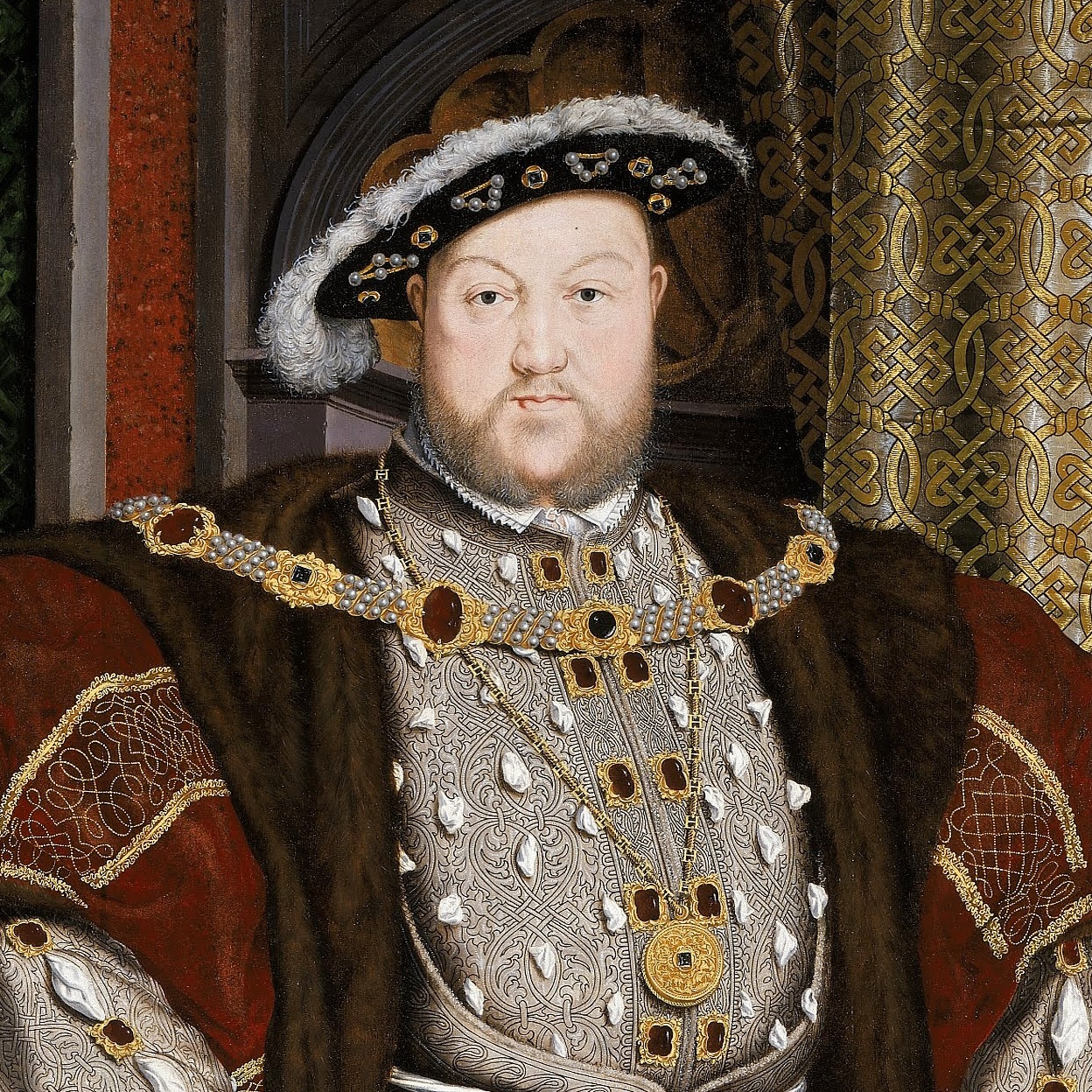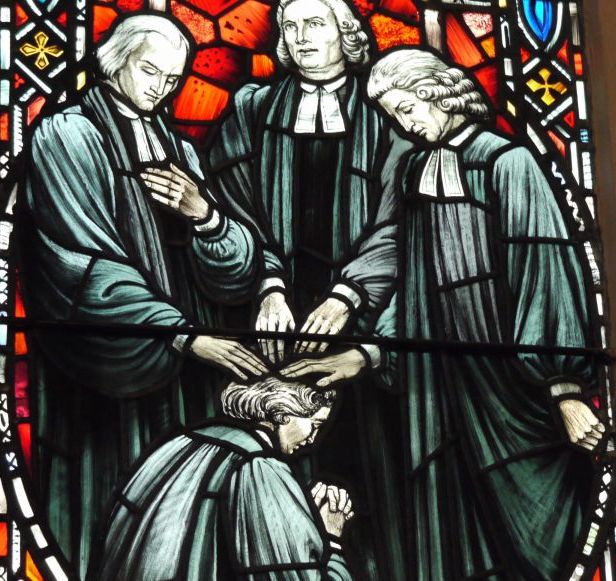Anglican Beliefs
Anglicanism is a product of history. To truly understand it, it is important to understand its development, and to view it within the context of its historical competition with the Catholic Church.
Historically, England has been a Catholic nation. When Christianity spread throughout the Roman Empire, England adopted it readily. By the 400s, England was faithfully following Roman Catholic Church. It would then continue to do so for over 1,000 years.
1534: King Henry VIII

However, on November 3, 1534 King Henry VIII passed the First Act of Supremacy, officially declaring himself head of the Church of England instead of the Pope. With this act, he officially created a separate Anglican Church. The next few monarchs would waver back and forth between Catholicism and Anglicanism, but eventually England largely submitted to its new religion (not least because of the harsh punishments for following a different religion than the monarch until the Toleration Act was passed in 1689).
The original cause of this break was because Henry VIII was childless and believed his wife to be infertile. As divorce is strictly prohibited among Catholics (and his wife's nephew, the Holy Roman Emperor, was currently occupying Rome), King Henry felt unable to secure an heir while his nation followed the Pope. Once King Henry was head of the church, he had his marriage annulled, but otherwise little changed immediately.
King Henry did not have any religious disagreements with the Catholic Church. In fact, just 13 years earlier, King Henry denounced Martin Luther as a heretic for his statements against the Pope. King Henry just wanted a son, so initially Anglicanism was the same as Catholicism except for being a bit more permissive with royal annulments.
However, King Henry soon began dissolving the English monasteries and selling the church lands to pay for the numerous wars he was involved in. Untethered from the Pope and with a pervasive Protestant influence in England, the Anglican church would diverge greatly from Rome over time.
1547: King Edward VI
After Henry VIII died in 1547, his son Edward VI became king, and he did have significant disagreements with the Catholic Church, having largely Reformed theology. Icons began being destroyed as idolatry, relics and holy water were denounced as superstitions, denying the real presence of Christ in the Eucharist, and liturgy underwent major changes. The largest liturgical change was that English supplanted Latin as the language of the church. Perhaps the biggest theological change was that the Anglican Church began to teach justification by faith alone, without works.
Eventually Queen Mary I would take the throne and briefly restore Catholicism and persecute Protestants instead, but her childless death would mean that her Protestant sister Elizabeth I would become queen.
Queen Elizabeth eventually settled on a confessional statement called the Thirty-Nine Articles. Although this did not go as far as her brother Edward VI's reforms, the Elizabethan Settlement would permanently define the Anglican church as a "middle way" between Catholicism and Protestantism.
1776: 🇬🇧 💔 🇺🇸
As North America was colonized by the United Kingdom, Anglicanism spread to America with the British. However, an issue arose with these parishioners in 1776 when the Thirteen Colonies declared independence from Britain. Clergy of the Church of England were still required to swear allegiance to King George III, but their country was in open rebellion against such king. Many Anglican clergy therefore fled to Canada or England, while the remaining clergy was cut off from London.

To sustain the church, Samuel Seabury, unable to convince the Archbishop of Canterbury to name him a bishop, instead got the Scottish bishops to consecrate him in Aberdeen in 1784. The General Convention then names this new American church the "Protestant Episcopal Church". Seabury remained uncooperative with the Archbishop Cornwallis. The Archbishop, worried that the Americans would follow the Scottish instead of the English church, conceded and named two further American Episcopal bishops.
As a result of this history, the Episcopal church mirrors many principles of the American government instead of the more medieval system used in the rest of the Anglican church. While retaining the British hierarchical system, it tied it to a representative democratic governance and made the General Convention the ultimate authority instead of an archbishop or a king. The Episcopal church also places much more importance on the role of the laity, which both follows Protestant trends and American philosophy, but also was a necessity during the Revolution when clergy was scarce.
Nonetheless, the Episcopal Church remained in full fellowship with the Church of England and part of the Anglican Communion. This model would continue to be followed in many other countries, as Canada, Nigeria, Uganda, Australia, and many other countries and regions have since become autocephalous and are now headed by their own primates. The Anglican church is thus many different independent churches who all submit themselves to the see of the Archbishop of Canterbury. Yet there remain some Anglican churches such as the Anglican Church in North America who have separated from Anglican churches which have changed their doctrine in recent years and have not yet received recognition from all other members of the Anglican Communion.
Belief Listing
How does one get saved?
Repent of your sins, believe in Jesus Christ's death and resurrection to save you, be baptized, and participate in the Eucharist.
Who gets saved?
Anyone who chooses by his own free will to believe and accept God's gift of grace will be saved.
Can one lose his salvation?
Yes, a Christian can lose his salvation by apostasy.
Who gets baptized and why?
The unsaved, typically as infants, get baptized as the first sacrament of Christian initiation, cleansing them of all sins.
How should baptism be done?
Baptism should be by pouring water on the head.
When does one receive the Holy Spirit?
The Holy Spirit is received at baptism.
What is the trinity?
The Trinity is God existing as one god in three equal, eternal, cosubstantial persons: God the Father, God the Son (Jesus Christ), and God the Holy Spirit.
What is the human nature?
Total depravity: Human nature is corrupt, naturally inclined to evil, and incapable of choosing God on his own.
Are we guilty of Adam's original sin?
No, we are not guilty of Adam's sin, but we did inherit the consequences and a corrupt human nature from him, causing us all to sin.
Are Christians required to keep the Old Testament ceremonial laws?
No, the ceremonial laws of Judaism were fulfilled and done away with by Jesus.
Can Christians become sinless in this earthly life?
No, although Christians can and should sin less, they can never become sinless in this life.
Do the elements of communion become the body and blood of Christ?
Consubstantiation: No, the elements do not become the body and blood of Christ, but Christ's body and blood are present alongside them.
Can one be baptized of behalf of someone who has died?
No, the dead cannot be baptized.
What happens if a saved person dies without being perfect?
There is no purgatory, but Christians may need to be purified after death in some way.
Did Mary ever sin?
No established doctrine
What spiritual gifts are available today?
Continuationism: All spiritual gifts are still available to believers.
What framework has God used in dealing with man?
Covenant theology: God acts either within the covenant of works or the covenant of grace.
What is the gift of tongues?
Varies widely
What are the requirements for clergy?
Most believe that any believer can be a pastor.
How many church ordinances/sacraments are there?
The church has two sacraments: Baptism and Holy Communion.
To whom do Christians need to confess their sins?
General sinfulness should be confessed to a priest. This is usually done as a group during a service.
How should a church be structured?
Episcopal: Churches should be governed by the bishop in that diocese, who in turn is governed by a primate of an autonomous province. The Archbishop of Canterbury is first among equals and is appointed by the King of England.
What day of the week should Christians worship?
Christians worship on Sunday.
How does God's revelation come to us today?
Prima scriptura: There are many sources of God's revelation, although none can contradict the Bible.
How many books are in the Bible?
There are 66 canonical books of the Bible: 39 Old Testament books and 27 New Testament books, but the Apocrypha is regularly used for examples of life and instruction of manners.
Was the Bible written inerrantly?
No, the Bible is not inerrant in any respect.
How was the earth created?
The earth was formed by gravity pulling dust together, which ultimately came from the Big Bang.
What is marriage?
Varies widely
Is sex permissible outside marriage?
Varies widely
When is divorce permissible?
Most believe divorce is only permissible for adultery.
May a Christian remarry while his former spouse is still alive?
Yes, a Christian may freely remarry after divorce.
Sources
- https://www.churchofengland.org/life-events/your-church-wedding/just-engaged/marriage-after-divorce
- https://www.anglican.ca/ask/faq/divorce/
- https://www.washingtonpost.com/world/how-the-church-of-england-has-evolved-on-divorce-from-henry-viii-to-meghan-markle/2018/05/15/85ca3388-4d6c-11e8-85c1-9326c4511033_story.html
When does a fetus become human?
Humanity begins at conception.
Is contraception permissible?
Yes, contraceptives are permissible.
Are blood transfusions permissible?
Yes, blood transfusions are permissible.
Should women cover their heads?
No, head coverings are no longer required due to cultural changes.
Should Christians drink alcohol?
Yes, drinking alcohol is fine as long as one does not get drunk.
Should Christians fight in wars?
Most believe that yes, Christians should fight in just wars.
Sources
- https://web.archive.org/web/20221126222307/https://ploughshares.ca/pl_publications/no-war-just-war-just-peace-statements-by-the-anglican-church-of-canada-1934-2004/
- http://anglicansonline.org/basics/thirty-nine_articles.html#:~:text=it%20is%20lawful%20for%20christian%20men%2C%20at%20the%20commandment%20of%20the%20magistrate%2C%20to%20wear%20weapons%2C%20and%20serve%20in%20the%20wars.
- https://www.episcopalchurch.org/glossary/just-war-theory/
How should Christians musically worship God?
Any style of worship music is acceptable.
Whom does the Holy Spirit come from?
Varies widely
Who can be demon-possessed?
Generally that demons can possess anyone.
Sources
- https://www.churchofengland.org/safeguarding/safeguarding-e-manual/safeguarding-children-young-people-and-vulnerable-adults/4-1
- https://drfrancisyoung.com/2018/06/29/publication-of-a-history-of-anglican-exorcism/
- https://books.google.com/books?id=MPe0DwAAQBAJ&pg=PA132&lpg=PA132
- https://books.google.com/books?id=MPe0DwAAQBAJ&pg=PA199&lpg=PA199
Do icons glorify God?
Yes, icons can be an aid to worship, but they are not used in liturgy.
Where does a Christian's soul go after death?
No established doctrine
When does the Tribulation happen?
Preterism: The millennial reign of Christ was the period of time where the church rapidly grew in number.
When will the church be raptured?
The church will not be raptured at any point.
When is the millennial reign of Christ happen?
Amillennialism: The millennial reign of Christ is an indefinite period of time beginning on the day of Pentecost and ending at His Second Coming.